- Newburyport Public Schools
- Special Education
- Program Descriptions
-
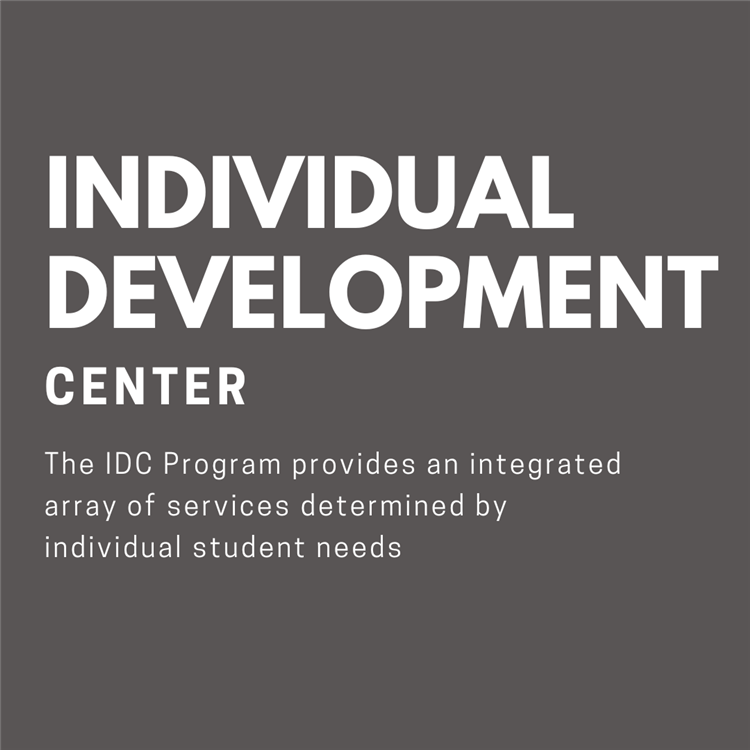
Individual Development Center
Student Needs
Students receiving support through the IDC Program often have a broad spectrum of learning, communication, and health needs, and require a higher level of individualization and support. Students in the IDC Program may have cognitive disabilities, physical challenges, complex medical conditions or multiple disabilities.
Overview
The IDC Program provides an integrated array of services as determined by individual student needs, including speech and language, occupational therapy, physical therapy, vision services, deaf and hard of hearing services, audiology, assistive technology and augmentative communication, as well as ongoing consultation with other specialists. Students participating in this program have opportunities for the development of functional and adaptive skills, total communication skill development, and augmentative communication, as well as supported inclusive experiences in the general education setting. Some students may require support, consultation, and program design from a Board Certified Behavior Analyst. Discrete trial and natural environment teaching is part of student’s programming when appropriate.
Goals/Mission
The primary goals of the IDC programs are to develop student skills that will: (1) maximize independence, (2) support learning and academic success, and (3) promote the overall well-being of each student.
Staffing
The centers are staffed with special educators, instructional assistants (IAs), and related services personnel such as speech/language pathologists and occupational therapists, as well as Board Certified Behavior Analysts as appropriate. The Team considers what staffing level is appropriate for the student to make effective progress towards his/her individual IEP goals and objectives. Staff are skilled at significantly modifying content for students, when necessary.
Curriculum and Services
The IDC uses the Common Core Curriculum, which may be accommodated or modified to meet each student’s individual learning profile and needs. The skills taught in the IDC integrate academic, vocational, life skills, and social skills development within school-based and community-based settings, providing all students with individualized opportunities to build a network of relationships, as well as to develop and apply new skills within typical settings and contexts.
The IDC is designed to provide specially-designed instruction to target goals and objectives in the specific qualifying areas as described in each student’s Individual Education Program (IEP). Specially-designed instruction that addresses the development of skills in the area of functional academics, adaptive, behavior, social skills, pre-vocational and independent living as well as developing a communication system that the student can utilize in becoming as self-sufficient as possible. As necessary, the principles of Applied Behavior Analysis are incorporated.
Some students may require individualized discrete trial training, social skills groups, and/or related services such as Occupational Therapy, Physical Therapy, or Speech & Language Therapy.
Integration opportunities exist within the students’ schools and communities. Functional Academics and Life Skills are reinforced through community outings and, for older students, pre-vocational and community service opportunities.
Consultation and Support
Communication and consultation takes place among members of the student’s team on a regular basis. Related service providers and outside specialists are available for consultation. This may include consultation from a doctorate-level BCBA; Orientation & Mobility Specialist; Vision Consultant; Teacher of the Deaf; and from an individual specializing in Assistive Technology or Alternative and Augmentative Communication. The team also consults with community and state agencies that are involved with the student.
-
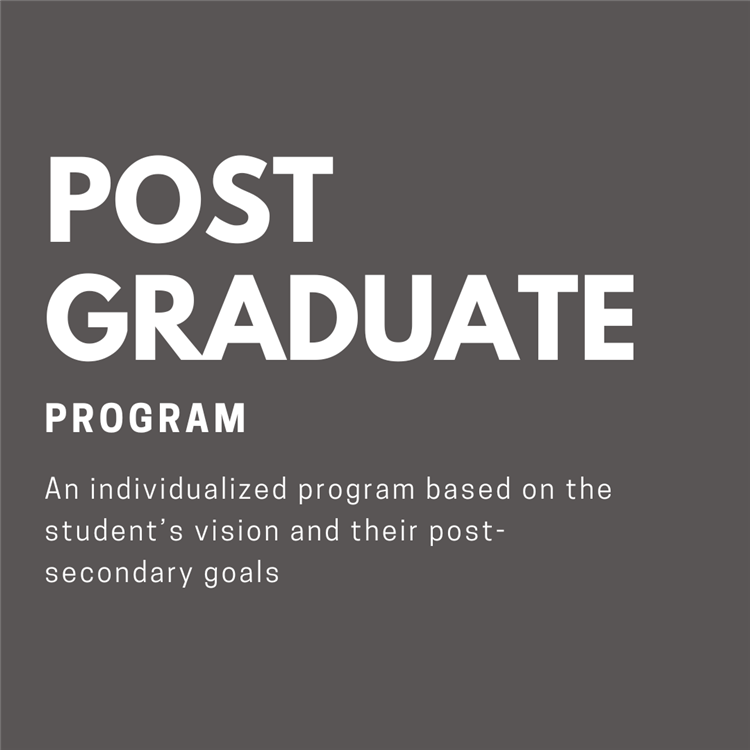
Post Graduate Program
Student Needs
Students serviced by the Post-Graduate program are ages 18-22 and have completed four years of high school but have not received a diploma. Students continue in the program until they turn 22 or receive a diploma, whichever comes first.
The program is designed for students with a range of disabilities in at least one of the following areas: 1) intellectual impairments, 2) multiple handicaps, 3) significant social and/or communication delays. All students in the program require intensive services to address Activities of Daily Living (ADLs) and pre-vocational/vocational training.
Overview
The Post-Graduate Program focus is individualized, based on the student’s vision and their post-secondary goals. The program provides students with functional academics, vocational training, and instruction in ADLs. The program is highly flexible and works closely with agencies to ensure a smooth transition to services at age 22. The program seeks to connect students with same-age peers through community opportunities, including partnerships with local colleges such as Northern Essex Community College.
Goals/Mission
By focusing on each student’s vision, the program aims to teach students self-advocacy and self-determination skills while preparing them for life after age 22.
Description
The program addresses students’ educational, leisure, vocational, and independent living skills. Examples are provided below.
- ADLs: meal preparation, cleaning, hygiene, fitness
- Functional Academics: time and money management, functional reading in the community
- Pre-Vocational: Resume-writing, job application completion, interviewing skills, appropriate dress and behavior, travel training, community safety
- Vocational: Students have internships and/or paid employment with a variety of community partners. On-site, individualized support is provided.
- Social skills: Social activities in the community; support, consultation and services from a Speech Language Pathologist and Board Certified Behavior Analyst are available.
Staffing
The program is supported by a special education teacher and Instructional Assistants who act as job coaches when in the community. Various specialists (Occupational Therapist, Speech-Language Pathologist, BCBA) may support and consult with the program.
Consultation and Support
The program has partnered with a number of agencies, businesses and organizations in the greater Newburyport area, such as:
- Newburyport Public Library
- Newburyport City Hall
- Spencer Peirce Little Farm
- Merrohawke Nature Center
- Northeast Independent Living Program
- Essex County Sheriff’s Department
- ARC of Greater Haverhill-Newburyport
- YWCA of Newburyport
- Northern Essex Community College
-
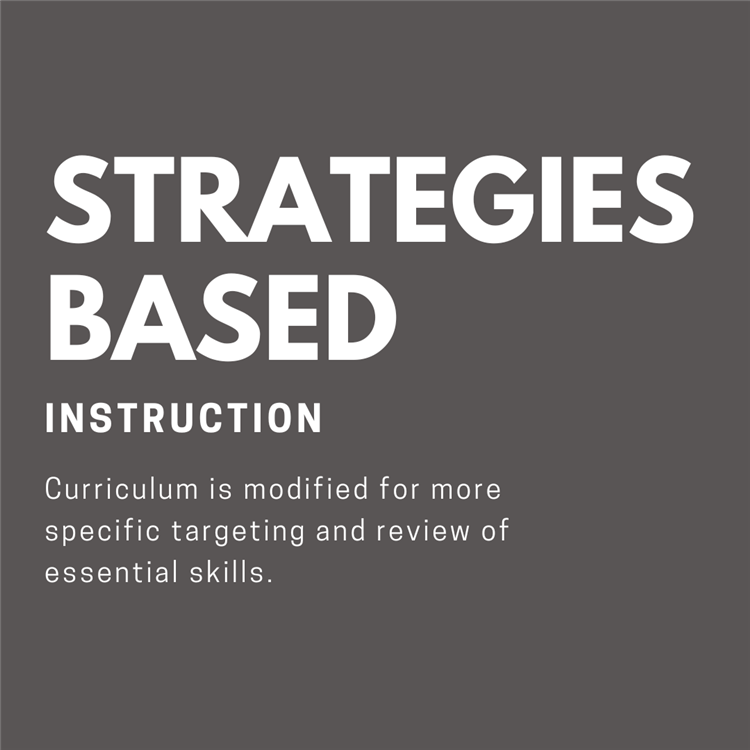
Strategies-Based Instruction
Newburyport Public Schools offers developmentally appropriate language-based programming for students in grades 2-8. Strategies-Based Instruction (SBI) is an instructional model designed specifically for students who, in the context of low average cognitive reasoning and healthy social-emotional well-being, are identified with dual challenges of low average receptive and expressive language - oral and written language processing and expression and specific learning disabilities in reading – word reading accuracy and fluency, or dyslexia.
In addition to difficulties with word reading accuracy and fluency, delays in receptive and expressive language often impact reading comprehension as well as a student’s ability to access the general education curriculum. Instruction in SBI is designed to support student strengths, address challenges, and foster independence through the development of effective language and literacy skills and strategies. Instruction includes a highly mediated approach to remediation and support in all components of language development, from structure to meaning, across the four domains of language: listening, speaking, reading, and writing. Development of a student’s personal learning awareness and respective strategies to create opportunities for success are integrated into the instructional model.
The overall goal of the SBI program is to develop oral and written language skills as well as literacy skills and strategies through a core curriculum that integrates speech and language services and includes small group specialized reading and writing instruction, and sometimes math, while providing continuity of targeted, integrated instruction and support not only to grade level curriculum across the grade but also vertically aligned across the grades. In all content areas, through a language-based team-teaching approach that includes the lead language-based special educator, speech and language pathologists, specialists, trained general ed partner teachers, and trained language-based instructional assistants, students are provided with high levels of support in all academic areas through instructional methodology that is deliberately paced, highly structured, multi-modal, and supports oral and written language processing and production. Although highly motivated to learn, significant pre-teaching and/or re-teaching is required and is provided through the core curriculum. Direct teaching of student skills taught through the core curriculum are emphasized throughout all classes, reinforcing strategies across all content areas: math, science, and social studies.
Student Profile
The SBI student profile is defined as follows:
- Determination of eligibility is Communication, Neurological, Developmental Delay, or Autism; also noted may be Specific Learning Disability (SLD): reading; may also include writing, math
- In addition to oral and written receptive and expressive language development, the student typically requires support in three or more of the following domains:
- Reading
- Written language
- Math
- Student skills
- Social skills
- The student requires a higher level of coordination of teaching and learning than that of the typical special education student.
- Multiple systematic interventions have been utilized previously and well-documented in an effort to create access to the general ed curriculum for the student.
The student profile is characterized by a combination of the following strengths and challenges:
- Cognitive
- Low average cognitive reasoning abilities in verbal comprehension and perceptual reasoning
- May have weaknesses in:
- Verbal and/or visual working memory, including efficiency of storage and retrieval
- Language processing and/or production rate compared to age-appropriate peers
- Language
- Low average receptive language, including vocabulary and listening comprehension
- May have a history of weak phonological processing disorder, including phonological awareness and/or rapid naming
- May experience difficulty formulating, organizing, and/or elaborating oral and/or written language
- Oral and/or written expression may be characterized by imprecision or lack of specificity of word choice and integration of new vocabulary
- Language impairment may impact the student’s social skills
- Academic weaknesses may include:
- Difficulty with phonemic awareness
- Difficulty decoding real words and non-words accurately in word lists and connected text
- Difficulty mastering and/or efficiently identifying high-frequency sight words
- Poor reading fluency, including automaticity, accuracy, prosody when reading connected text
- Reading comprehension deficits
- Persistent spelling deficits
- Challenges with applied syntax and written composition within sentences and paragraphs
- May have difficulty memorizing and efficiently using math facts and applying sequences in multi-step math problems
- Diminished rate of skill acquisition
Entrance Criteria
A diagnostic profile will be completed for each student evaluated for challenges with language processing and production and reading to ensure consistency across evaluations and coordinated evaluation protocols between special educators, SLPs, and School Psychologists. The student profile is as noted above and the student does not present with significant behavior or emotional concerns.
- Referral Information
- Current IEP services
- Annual review data
- Completed referral form with evaluations attached (Psychological, Academic, Speech/Language)
- Observation of the student
Exit Criteria
The purpose of SBI is to provide intensive remediation in oral and written language processing and production and literacy so students can both access and participate in the general curriculum. The team will meet to review student progress. Readiness to fade services will be determined by a student’s IEP team. When students are ready, the team will work to develop a transition plan.
- Students demonstrate readiness by:
- Accessing essential features of academic curriculum with increasing independence
- Requiring a lower level of case management
- Applying learned academic, social, and student skills in larger group settings with minimal adult support
-
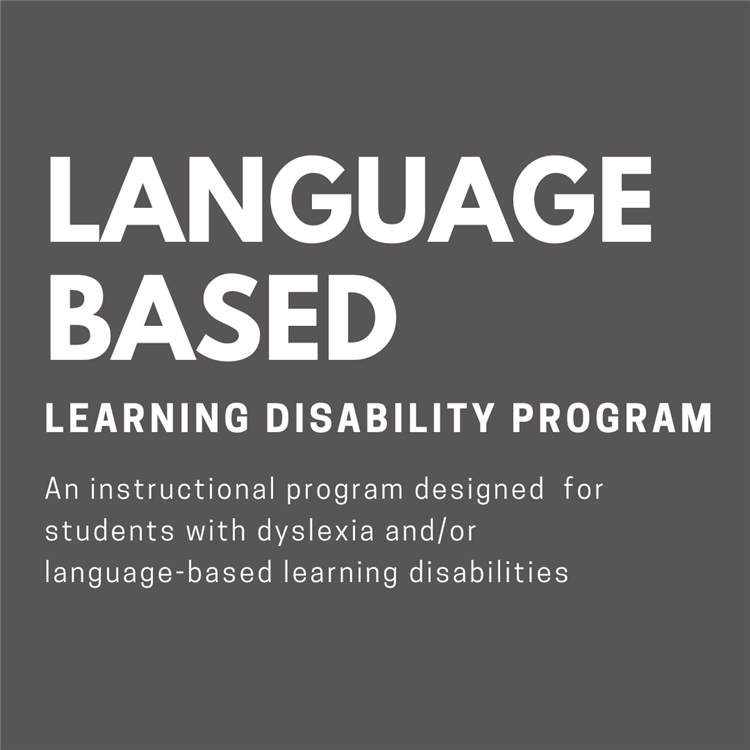
Language-Based Program
Newburyport Public Schools offers developmentally appropriate language-based programming for students in grades 2-8.
Language-Based Instruction (LBI) is an instructional model designed specifically for students with specific learning disabilities in reading – word reading accuracy and fluency, or dyslexia, in the context of average to above cognitive reasoning and healthy social-emotional well-being. Instruction is designed to support student strengths, address challenges, and foster independence through the development of effective language and literacy skills and strategies, which includes remediation and support in all components of language development, from structure to meaning, across the four domains of language: listening, speaking, reading, and writing. Development of a student’s personal learning awareness and respective strategies that create opportunities for success are integrated into the instructional model.
The overall goal of the LBI program is to develop language and literacy skills and strategies through a core curriculum that includes small group specialized reading and writing instruction while providing continuity of integrated instruction and support not only to grade level curriculum across the grade but also vertically aligned across the grades. In all content areas, through a language-based team-teaching approach that includes the lead language-based special educator, specialists, trained general ed partner teachers, and trained language-based instructional assistants, students are provided with consistent instructional methodology that is highly structured, multi-modal, and supports language processing and production. Study and executive functioning skills are emphasized throughout all classes, reinforcing strategies across all content areas: math, science, and social studies.
Student Profile
The LBI student profile is defined as follows:
Determination of eligibility is Specific Learning Disability (SLD): reading; may also include writing, math; may include Communication related to oral expression
The student profile is characterized by a combination of the following strengths and challenges:
Cognitive
- Average to superior cognitive reasoning abilities in verbal comprehension and perceptual reasoning
- Age-appropriate language comprehension skills, particularly with oral language
- May have weaknesses in
- Verbal and/or visual working memory, including efficiency of storage and retrieval
- processing and/or production rate
Language
- May have a history of weak phonological processing disorder, including phonological awareness and/or rapid naming
- Receptive language is commensurate with or higher than expressive language, including vocabulary
- Listening comprehension is typically average or above and reflective of cognitive reasoning abilities
- May experience difficulty formulating, organizing, and/or elaborating oral and/or written language
- Oral and/or written expression may be characterized by imprecision or lack of specificity of word choice and integration of new vocabulary
Academic weaknesses may include:
- Difficulty with phonemic awareness
- Difficulty decoding real words and non-words accurately in word lists and connected text
- Difficulty mastering and/or efficiently identifying high frequency sight words
- Poor reading fluency, including automaticity, accuracy, prosody when reading connected text
- Reading comprehension challenges can be attributed to inaccurate and/or inefficient word reading accuracy and/or fluency
- Persistent spelling deficits
- Challenges with applied syntax and written composition within sentences and paragraphs
- May have difficulty memorizing and efficiently using math facts and applying sequences in multi-step math problems
Entrance Criteria
A diagnostic profile will be completed for each student evaluated for challenges with reading to ensure consistency across evaluations and coordinated evaluation protocols between special educators, SLPs, and School Psychologists. The student profile is as noted above and the student does not present with significant behavior or emotional concerns.
- Referral Information:
- Current IEP services
- Annual review data
- Completed referral form with evaluations attached (Psychological, Academic, Speech/language)
Exit Criteria
The purpose of LBI is to provide intensive remediation in language and literacy so students can both access and participate in the general curriculum. The team will meet to review student progress. Readiness to fade services will be determined by a student’s IEP team. When students are ready, the team will work to develop a transition plan.
Students demonstrate readiness by:
- Accessing grade level text through a combination of reading, digital technologies, and compensatory strategies
- Demonstrating proficient decoding skills
- Producing age-appropriate written expression with or without digital technologies
- Applying strategies, showing increased independence and self-confidence as a learner
- Understanding his/her strengths and needs as a learner and self-advocating effectively with adults and peers
-
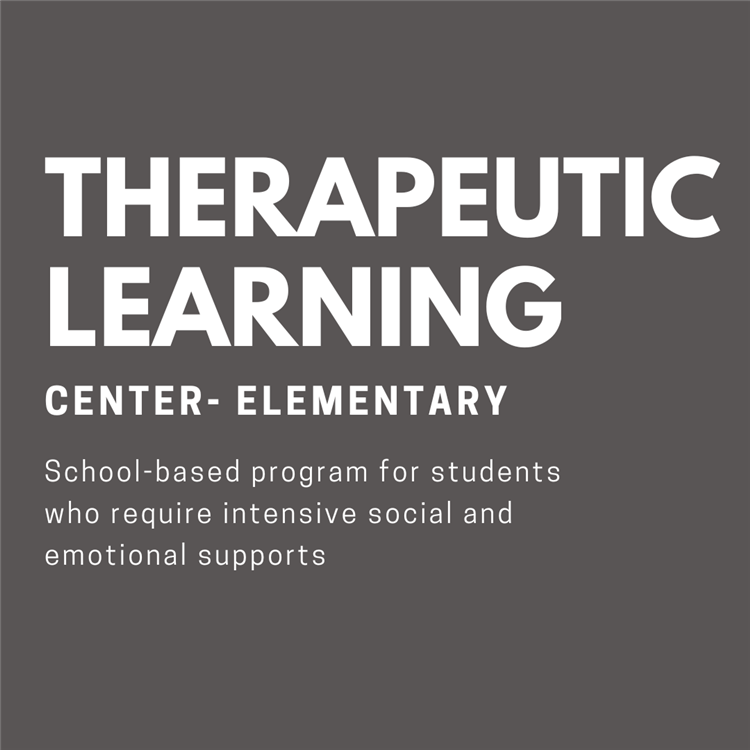
Elementary Therapeutic Learning Center
Student Needs
Students who require support from TLC programs qualify for special education under the category of Emotional Impairment.
Students are cognitively and behaviorally capable of accessing the curriculum and making effective progress within the support and structure of the program.
Overview
TLC is a special education, school-based program for students who require intensive social and emotional supports. This program provides comprehensive, evidence-based services for students with a history of emotional disabilities that impact their learning. The center offers a continuum of services from full inclusion to direct instruction in a separate setting; adaptations of the educational environment; positive behavior intervention plans; instruction in relaxation techniques; counseling and consultation with classroom teachers to support inclusion. The program engages and collaborates with families to support the whole child and their success at home, in the community, and in school.
Goals/Mission
The program aims to help students to feel safe, respected, supported and challenged, and for student to build skills to succeed in academic and social and behavioral realms within the public school setting.
Staffing
Special education teachers, instructional assistants, and school counseling staff provide services. The program relies on the support and expertise of our team of related service providers within the building and school district (e.g. SLP, OT). School Counselors and/or Psychologists are available for consultation, group work, and individual work. Board Certified Behavior Analysts are available for consultation, evaluation, and creation of individualized behavior plans.
Curriculum and Services
The program is designed to create an environment where each student’s individual strengths and weaknesses are supported in a way that leads to academic and emotional growth. Program staff develop and support a therapeutic alliance with each student and their family. Students’ skill deficits are addressed with social/emotional curriculum and therapeutic interactions.
Students work to develop the ability to identify their emotions, connect their emotions to behaviors, and learn and practice healthier choices for the future. The therapeutic program tracks behaviors and student progress through the use of level systems, point sheets with individual targets, and daily communication logs with key team members.
Academic curriculum is based on grade level district curriculum driven by the Common Core Standards and specially designed to be accessible to all students as determined by the academic goals and benchmark objectives in their Individual Education Plans (IEPs). Academics are structured but flexible, scaffolded and differentiated in their nature.
Specialized Program Staff
- Lead Special Education Teachers trained in supporting a therapeutic milieu
- Teacher Assistants who work under the direction of the lead teacher
- All staff are trained in Safety Care, a comprehensive program to effectively prevent, minimize and manage behavioral challenges
-
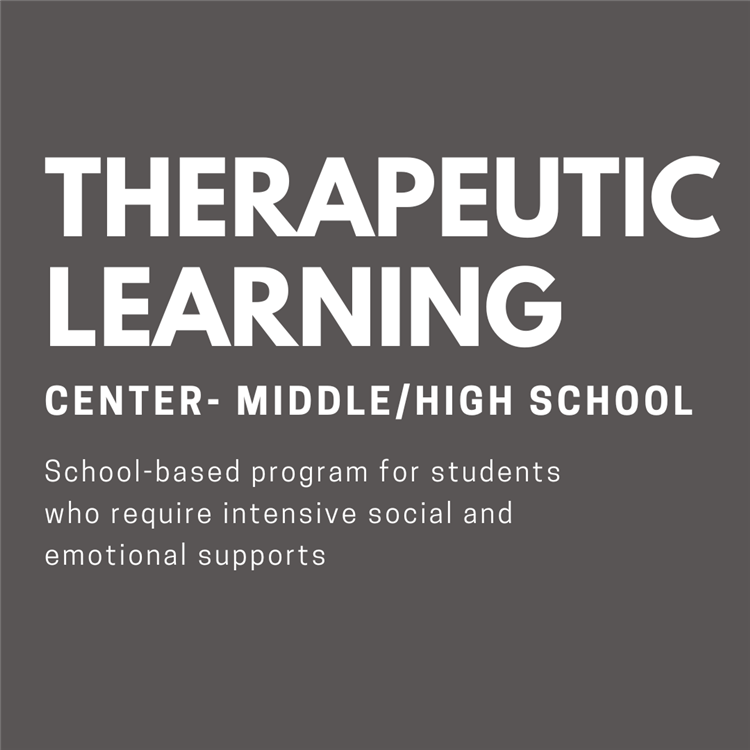
Middle/High School Therapeutic Learning Center
Student Needs
Students who require support from TLC programs qualify for special education under the category of Emotional Impairment.
Students are cognitively and behaviorally capable of accessing the curriculum and making effective progress within the support and structure of the program.
Overview
TLC is a special education, school-based program for students who require intensive social and emotional supports. This program provides comprehensive, evidence-based services for students with a history of emotional disabilities that impact their learning. The center offers a continuum of services from full inclusion to direct instruction in a separate setting; adaptations of the educational environment; positive behavior intervention plans; instruction in relaxation techniques; counseling and consultation with classroom teachers to support inclusion. The program engages and collaborates with families to support the whole child and their success at home, in the community, and in school.
Goals/Mission
The program aims to help students to feel safe, respected, supported and challenged, and for students to build skills to succeed in academic and social and behavioral realms within the public school setting.
Staffing
Special education teachers, instructional assistants, and school counseling staff provide services. TLC program staff communicate and coordinate closely with Newburyport High School guidance counselors, and as needed/when possible, with external providers and stakeholders. TLC is supported by a team that includes the District Director of Student Services, NHS administrators, and the NHS Special Education Team Leader. The school special education leader is the direct administrative support and the psychologist is the clinical consultation support. Indirect and direct support from the RTI team is also available.
Curriculum and Services
The teacher provides instruction (delivering curriculum) to students as needed up to and including delivering all academic instruction via TLC; IA provides individualized academic support throughout the day. The program is designed to create an environment where each student’s individual strengths and weaknesses are supported in a way that leads to academic and emotional growth. Program staff develop and support a therapeutic alliance with each student and their family. Students’ skill deficits are addressed with social/emotional curriculum and therapeutic interactions. Students work to develop the ability to identify their emotions, connect their emotions to behaviors, and learn and practice healthier choices for the future.
Specialized Program Staff
- Lead Special Education Teachers trained in supporting a therapeutic milieu
- Instructional Assistants who work under the direction of the lead teacher
- The social worker assigned to the TLC program provides ongoing counseling and support for students and connects with outside providers
- All staff are trained in Safety Care, a comprehensive program to effectively prevent, minimize and manage behavioral challenges

